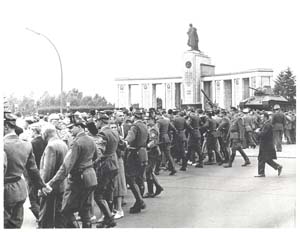National Security Archive
While Condemning Wall in Public, U.S. Officials Saw "Long Term Advantage" if Potential Refugees Stayed in East Germany. Three Days Before Wall Went Up, CIA Expected East Germany Would Take "Harsher Measures" to Solve Refugee Crisis.
Disturbed By Lack of Warning, JFK Asked Intelligence Advisers to Review CIA Performance
National Security Archive Electronic Briefing Book No. 354
Washington, D.C., August 12, 2011 - Fifty years ago, when leaders of the former East Germany (German Democratic Republic) implemented their dramatic decision to seal off East Berlin from the western part of the city, senior Kennedy administration officials publicly condemned them. Nevertheless, those same officials, including Secretary of State Dean Rusk, secretly saw the Wall as potentially contributing to the stability of East Germany and thereby easing the festering crisis over West Berlin. Indeed, U.S. ambassador to the Soviet Union Llewellyn Thompson had written that "both we and West Germans consider it to our long-range advantage that potential refugees remain [in] East Germany." This surprising viewpoint from Thompson and Rusk, among others, is one of a number of points of interest in declassified documents posted today by the National Security Archive.
 |
"Forming a human chain, West Berlin police force hundreds of angry, jeering West Berliners, past the Soviet War Memorial and away from the Brandenberg Gate, 14 August 1961. East German forces held off the surging crow with water cannon before West Berlin police pushed them back to prevent a major incident" [from the USIA caption] |
|
The previously secret documents also reveal new information about one of the remaining unknowns from the period—how well (or poorly) U.S. intelligence agencies carried out their responsibility. In one record, President John F. Kennedy's frustration shows through over the fact that he did not receive adequate advance warning of the East German move.
Some of the documents posted today were released by the CIA through its CREST database at the National Archives, College Park. As a few of them are heavily excised, the National Security Archive has requested further declassification review. Other relevant documents--CIA daily reports to President Kennedy during the Wall crisis--remain classified because of agency insistence that sources and methods are at risk. The Archive has appealed these denials.
*********
On 13 August 1961, East German security officials imposed harsh controls at the East-West borders in Berlin designed to stop the flow of thousands of refugees, mostly fleeing through West Berlin. Implausibly justifying the measures as a defense against West German aggression, the fundamental concern was the threat of economic disaster for the former German Democratic Republic (GDR). To stop its citizens from escaping, the GDR put up barbed-wire fences which soon turned into concrete barriers. A wall was being constructed (although it became a taboo in the GDR to call it a "Wall" (
Note 1)). Declassified documents posted today by the National Security Archive shed light on how U.S. diplomats and intelligence analysts understood the East German refugee crisis and the sector border closings.
Read more >



![NEOCASTRISMO [Hacer click en la imagen]](http://4.bp.blogspot.com/_5jy0SZhMlaU/SsuPVOlq2NI/AAAAAAAAH1E/4xt2Bwd2reE/S150/ppo+saturno+jugando+con+sus+hijos.jpg)






No hay comentarios:
Publicar un comentario